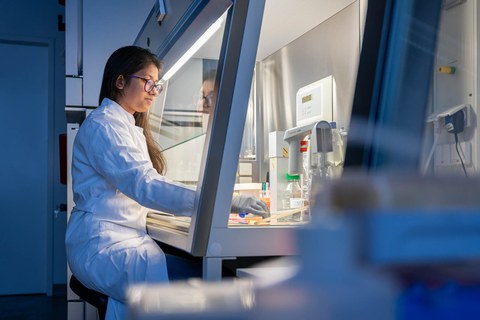Table of contents
Admission requirements
Prerequisite:
• a university degree in engineering (preferably materials science, nanotechnology, computer science) or in the medical field (medicine) or in one of the natural sciences (preferably in biology, biotechnology, chemistry, biochemistry, physics)
• Proficiency in English at B2+ level of the Common European Framework of Reference for Language
• good knowledge in the fields of Biochemistry, Cell biology, Materials science, Mathematics and Physics. Where appropriate, an assessment is made by an aptitude interview.
Aptitude assessment procedure
The participation in an aptitude assessment or selection procedure is a prerequisite for enrollment in this degree program. Please note that the deadline for submitting an application may be earlier than the application deadlines for the degree program (see above under application deadlines). The following links will provide you with information on all documents to be submitted within the specified deadline and on the relevant regulations.
- Information and documents to be submitted
- Notes and Rules of Procedure for the Aptitude Test [Eignungsfeststellungsordnung] on the webpage of the discipline
Notes on the application process
If, at the time of application, proof of the first degree qualifying the applicant for a profession is not yet available, the application will be considered under the precondition that 80% of the credit points attainable for the degree have already been achieved based on completed module examinations or the final thesis and the colloquium (if applicable). A certification from the awarding institute of higher education (examination office) serves as proof of the above-mentioned academic achievements. You can find the appropriate form on the Admissions Office website.
General information about the degree program

Make the transition to an academic career easy thanks to our partner post-graduate programs such as Dresden International Graduate School for Biomedicine and Bioengineering (DIGS-BB).
Let's go to the nanoscale! This is the level of spatial resolution where technology and modern biology meet in the 21st century.
Proteins, the powerful molecules in our cells and all forms of life on earth, are nanomachines encoded in a unique genetic language. They function on a much smaller scale and with greater efficiency than is currently possible with available microtechnologies. Become a molecular bioengineer and learn how to construct cellular machines.
The Molecular Bioengineering degree program unites a novel combination of biology, biochemistry, biophysics, materials science, medicine, bioinformatics and nanotechnology.
Join us and learn the fundamentals of biology, biomedicine and bionanotechnology. Combine life sciences with technology. Explore biology to understand how nature constructs its powerful molecules. Use nanotechnology and computational biology to design nanomachines, tiny molecular factories and biomaterials for medical and industrial applications.
Study contents
Molecular Bioengineering is a comprehensive Master's degree program. Over four semesters, you will receive a sound education and gain coveted laboratory experience.
The first three semesters are dedicated to building foundational knowledge in a variety of courses that fall into two categories:
— The biomedical modules include genomics and stem cell engineering, proteomics, and chemistry with biomolecules.
— The technological modules include bioinformatics, bionanotechnology and biomaterials, biophysics and cellular machines.
From the second semester, you will have the opportunity to continue your education in your areas of interest by choosing one of two elective subjects:
— Applications in Biomedicine (materials in biomedicine, biomedical tissue engineering)
— Applications in Technology (microsystems engineering, applied bionanotechnology)
During the third semester, you will be able to gain valuable practical experience in one of the laboratories at the CMCB, TU Dresden or a partner institution.
The course ends in the fourth semester, during which you will complete your Master's thesis. You will have the flexibility to choose from a variety of research topics and work in one of the research groups at B CUBE, BIOTEC, or CRTD. You may also join groups at other TU Dresden departments or partner institutions.
Stay abroad
Would you like to spend a semester abroad? Whether it is a semester, an internship or a language course abroad, you will definitely benefit from the international experience. You can improve your subject and language skills, establish new contacts, make friends, get to know other cultures, and much more. You can find more information on the International Office’s website.
Occupational fields
The dynamic development in the life sciences and biotechnology creates an enormous demand for qualified researchers in these fields. Graduates of the Molecular Bioengineering program should be able to find suitable positions in research institutes as well as in the biotechnology, pharmaceutical and software industries.
Study documents
The official announcements of TU Dresden include all published regulations . Please use the search bar to find the document you need: Official proclamation
The regulations are also available on each institution’s website.
- Examination Regulation
- Study Regulation
- Aptitude Assessment Regulation
… you will find on the respective site of the responsible unit.
Contacts
Admissions Office
ServiceCenterStudies
Post address:
Technische Universität Dresden
Immatrikulationsamt
01062 Dresden
- Tel.
- +49 351 463-42000
Office Hours:
Center for Molecular and Cellular Bioengineering (CMCB)
Academic Advisor
Mr. Prof. Konstantinos Anastassiadis
Center for Molecular and Cellular Bioengineering (CMCB)
Office address:
Biotechnologisches Zentrum an der TU Dresden (BIOTEC), Tatzberg 47-49, Raum 127
Post address:
TU Dresden
Center for Molecular and Cellular Bioengineering (CMCB)
Biotechnologisches Zentrum (BIOTEC)
Tatzberg 47/49
01307 Dresden
- Tel.
- +49 351 463-40127
Office Hours:
Please arrange an appointment or visit us during our office hours.
International Office
International Office
Office address:
Bürogebäude Strehlener Str. (BSS) 22, 6. Etage, Raum 671
Post address:
TU Dresden
International Office
01062 Dresden
- Tel.
- +49 351 463-42000
Office Hours:
